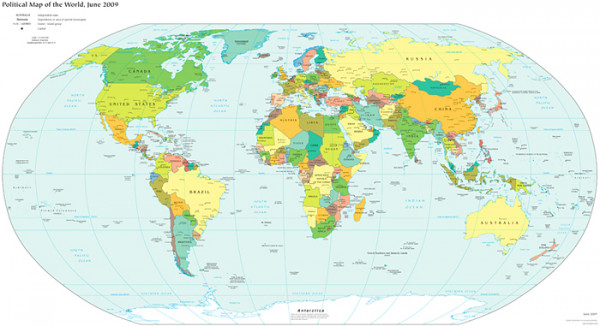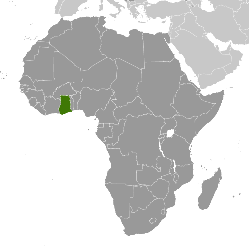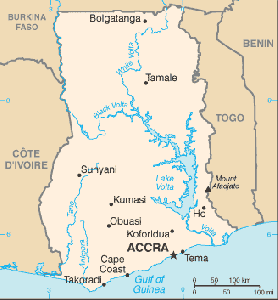Ghana: The Gold Coast
Ghana has been known as the Gold Coast since the 17th century. British merchants named it "the Gold Coast" because they were impressed with the gold resources in the area.
Overview
| Flag |
|
| Anthem |
God Bless Our Homeland Ghana |
| Capital |
Accra |
| Largest city |
Accra |
| Official language(s) |
English |
Demonyma name for a resident of a locality, often the same as the name of the people's native language
|
Ghanaian |
| Government |
Constitutional democracy |
| Area |
238,535 km2, 92,098 sq mi |
| Population |
~ 24 million |
| Currency |
Ghanaian cedi (GHS) |
| Internet TLD |
.gh |
Geography
The Republic of Ghana is a country located in West Africa that borders Côte d'Ivoire (Ivory Coast) to the west, Burkina Faso to the north, Togo to the east and the Gulf of Guinea to the south.
Accra is the capital and most populous city of Ghana. It is the administrative, communications, and economic centre of the country. The city has a population of 3,963,264. Other large cities are Kumasi (2,604,909), Tamale (390,730) and Takoradi (260,651).
Society and culture
Ghana is an ethnically diverse country; thus, Ghanaian culture is a mixture of all its ethnic groups. It is most
evidentobviously true by simple observation in Ghanaian
cuisinea characteristic style of preparing food, the arts and clothing. The celebration of festivals in Ghana is an essential part of Ghanaian culture.
Population
Ghana has a population of about 24 million people. It is home to more than 100 different ethnic groups. Fortunately, Ghana has not seen the kind of ethnic conflict that has led to civil war in many other African countries. The ethnic groups in Ghana are the Akan (49.3%), Mole-Dagbon (15.2%), Ewe (11.7%), Ga-Dangme (7.3%), Guan (4%), Gurma (3.6%), Gurunsi (2.6%), Mande-Busanga (1%), other tribes (1.4%), others (Hausa, Zabarema, Fulani) (1.8%).
Languages
Ghana has 47 ethnic languages. English is the country's official language and
predominatesto dominate or hold power over, especially through numerical advantage government and business affairs. It is also the standard language used for educational instruction. Native Ghanaian languages are divided into two linguistic subfamilies of the Niger-Congo language family. Languages belonging to the Kwa subfamily are found predominantly to the south of the Volta River. They are spoken by about 75% of the country's population. The languages belonging to the Gur subfamily are found predominantly to the north. Nine languages have the status of government-sponsored languages: Akan,
specificallyexplicitely, definitely, especially Ashanti Twi, Fanti, Akuapem Twi, Akyem, Kwahu, Nzema, Dagaare/Wale, Dagbani, Dangme, Ewe, Ga, Gonja and Kasem.
Religion
Religious
tolerancean acceptance or patience with the beliefs, opinions or practices of others in Ghana is very high. The major Christian celebrations of Christmas and Easter are recognised as national holidays. Religious
divisionseach of the separate parts in Ghana are as follows: Christian 68.8%, Muslim 15.9%, Traditional African beliefs 8.5%. The southern part of the nation is more Christian, while the north is more Islamic.
Government and politics
Ghana was created as a parliamentary
democracyrule by the people, either directly or through elected representatives at independence in 1957. The 1992 constitution divides powers among a President, Parliament, Cabinet, Council of State, and an independent
judiciarythe court system and judges considered collectively. The Government is elected by universal
suffragea vote in deciding a particular question. The legal system is based on British common law, customary (traditional) law, and the 1992 constitution. Major parties in Ghana are the National Democratic Congress (NDC), the New Patriotic Party the Convention People's Party. The current president of Ghana is John Atta Mills, a candidate of the NDC.
Economy
Well
endowedto be furnished with something naturally with natural resources, Ghana has twice the per capita
outputproductionof the poorer countries in West Africa. Even so, Ghana remains somewhat dependent on trade and international
assistanceaid, help. About 28% of the population live below the international
povertythe state of being poor or needy line of US$1.25 a day. Ghana, known for its gold in
colonialpertaining to a period when a country or territory was a colony times, remains one of the world's top gold producers. Other exports such as cocoa,
timberwood that has been pre-cut and is ready for use in construction, electricity, diamond,
bauxitethe principal ore of aluminium; a clay-like mineral, and
manganesea metallic chemical element are major sources of foreign exchange. The economy continues to
relyto have confidence; to trust; to depend on heavily on agriculture.







